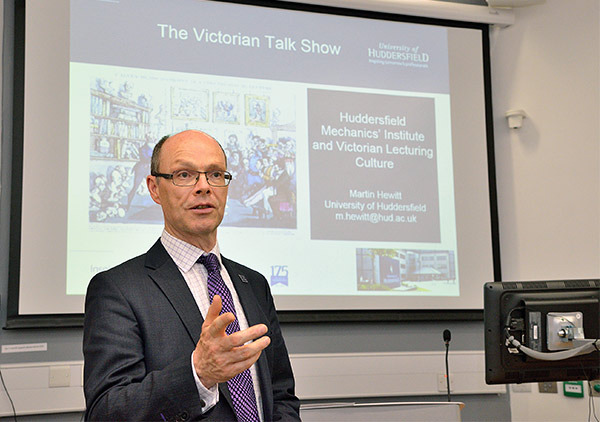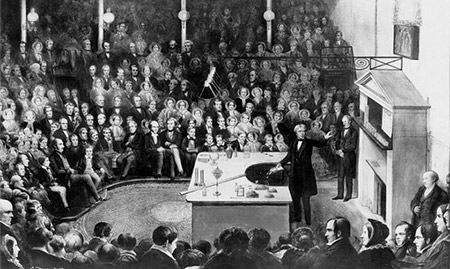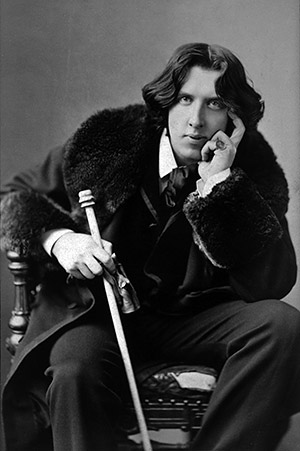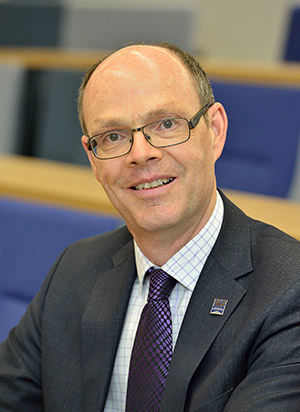175th Anniversary Lecture - The Victorian Talk Show

Fri, 13 May 2016 14:38:00 BST
Before television and social media, the ‘public lecture’ was the big night-out for the Victorians, as Professor Martin Hewitt explained in his public lecture
► Michael Faraday's public lecture in 1856
FOR many Victorians, an entertaining and instructive night-out meant attendance at a public lecture. The subjects ranged from earnest scientific topics to exotic travellers’ tales and tantalisingly-titled talks such as “Brain action, as illustrated by dreams, mesmerism and ghost-seeing”. The lecture circuit had its star performers, including Oscar Wilde and the explorer Henry Morton Stanley – both of whom came to Huddersfield – and the latest magic lantern technology became a big attraction.
The University of Huddersfield’s Professor Martin Hewitt (pictured above) is a leading researcher into many aspects of Victorian Britain and he has uncovered and written about the largely forgotten culture of the public lecture.
It was the subject of a public lecture on his own – titled The Victorian Talk Show.
The University is directly descended from a Mechanics’ Institution founded in Huddersfield in 1841, and its 175th anniversary is being commemorated in a series of lectures. Professor Hewitt, who is Dean of Music, Humanities and Media, gave the second in the sequence. He ranged widely over the subject of public lecturing in the second half of the 19th century, placing an emphasis on Huddersfield and district.
◄ Oscar Wilde was a star performer on the Victorian public lecture circuit
Setting the scene, Professor Hewitt told his audience how Victorian Britain was saturated by lectures, public meetings and sermons by popular preachers.
At mid-century, even a relatively modest town would have been the venue for an average of more than one public meeting a night; in larger towns and cities, by the 1860s and 1870s, there might have been half a dozen daily. Most congregations heard two sermons every Sunday, and quite frequently a religious lecture during a week night. There was also a bewildering array of associations, from parochial young men’s societies to political clubs, organised popular lectures and debates.
Public meetings could attract massive numbers and even apparently dry academic subjects could draw huge crowds, such as the 3,700 that attended John Tyndall’s lecture on “Crystalline and Molecular Forces” in the Manchester Penny Science series in the 1870s.
Naturally, the lecture was also an important feature of life in the West Riding, with mechanics’ institutes being popular venues. In fact, lectures became crucial for the financial survival of some institutes, such as Bradford, where audiences of 1,000 could be attracted to a series that included some of the stars of the circuit.
 The country developed a cadre of semi-professional lecturers, and Professor Hewitt (pictured right) describes some of the star turns, such as the “man of action” Archibald Forbes, with his tales from war zones; the ex-Chartist Henry Vincent, who was a fiery speaker on behalf of liberal causes; and the popular comedian George Grossmith, whose “Humorous Lecture on Lecturing” actually mocked the various styles of his fellow speakers.
The country developed a cadre of semi-professional lecturers, and Professor Hewitt (pictured right) describes some of the star turns, such as the “man of action” Archibald Forbes, with his tales from war zones; the ex-Chartist Henry Vincent, who was a fiery speaker on behalf of liberal causes; and the popular comedian George Grossmith, whose “Humorous Lecture on Lecturing” actually mocked the various styles of his fellow speakers.
But the extent to which Mechanics’ Institutes became venues for popular lecturing could earn criticism. William Heaton of Leeds slammed the “ridiculous syllabuses of lectures … and the puerile attempts made in some of the institutions to amuse, not to educate, the people”. He went on to praise the Huddersfield Mechanics’ Institution for not following this route.
Professor Hewitt analysed the fact that the Huddersfield Institution was distinctive in being a mechanics’ institute in a large town that did not place heavy emphasis or reliance on public lectures. Instead, a higher priority was given to classes, including large numbers for boys whose schooling had been neglected.
In Huddersfield, therefore, the Mechanics’ Institution lived up to the comment by a local observer that such institutes should offer “solid education, apart from all flummery and folly”.
Future lectures
There are two more public lectures in the 175th anniversary series. Free of charge, they take place in the University’s West Building Lecture Theatre at 7pm. To reserve places visit http://www.hud.ac.uk/events/. For further information, contact Sybilla Daley on 01484 471568 or e-mail events@hud.ac.uk.
- On Wednesday 18 May,Dr Merrick Burrow will show how poetry flourished among the working classes during the Victorian period. It was a passion fostered at Mechanics’ Institutes and encouraged by leading authors such as Charlotte Brontë and Charles Dickens. Both gave talks at Mechanics’ Institutes.
- On Wednesday 25 May, Dr Martyn Walker joins the University’s Affiliate Professor of Chemistry, Rob Brown, to explore how chemistry teaching and research has evolved since 1843, when Huddersfield Mechanics’ Institution offered its first courses in a subject that was of vital importance to local and national industry.







